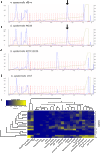A commensal strain of Staphylococcus epidermidis protects against skin neoplasia
- PMID: 29507878
- PMCID: PMC5834004
- DOI: 10.1126/sciadv.aao4502
A commensal strain of Staphylococcus epidermidis protects against skin neoplasia
Abstract
We report the discovery that strains of Staphylococcus epidermidis produce 6-N-hydroxyaminopurine (6-HAP), a molecule that inhibits DNA polymerase activity. In culture, 6-HAP selectively inhibited proliferation of tumor lines but did not inhibit primary keratinocytes. Resistance to 6-HAP was associated with the expression of mitochondrial amidoxime reducing components, enzymes that were not observed in cells sensitive to this compound. Intravenous injection of 6-HAP in mice suppressed the growth of B16F10 melanoma without evidence of systemic toxicity. Colonization of mice with an S. epidermidis strain producing 6-HAP reduced the incidence of ultraviolet-induced tumors compared to mice colonized by a control strain that did not produce 6-HAP. S. epidermidis strains producing 6-HAP were found in the metagenome from multiple healthy human subjects, suggesting that the microbiome of some individuals may confer protection against skin cancer. These findings show a new role for skin commensal bacteria in host defense.
Figures





Comment in
-
Comment on "A commensal strain of Staphylococcus epidermidis protects against skin neoplasia" by Nakatsuji et al.Sci Adv. 2019 Sep 11;5(9):eaaw3915. doi: 10.1126/sciadv.aaw3915. eCollection 2019 Sep. Sci Adv. 2019. PMID: 31535021 Free PMC article.
References
-
- Grice E. A., Kong H. H., Conlan S., Deming C. B., Davis J., Young A. C.; NISC Comparative Sequencing Program, Bouffard G. G., Blakesley R. W., Murray P. R., Green E. D., Turner M. L., Segre J. A., Topographical and temporal diversity of the human skin microbiome. Science 324, 1190–1192 (2009). - PMC - PubMed
-
- Byrd A. L., Deming C., Cassidy S. K. B., Harrison O. J., Ng W. I., Conlan S.; NISC Comparative Sequencing Program, Belkaid Y., Segre J. A., Kong H. H., Staphylococcus aureus and Staphylococcus epidermidis strain diversity underlying pediatric atopic dermatitis. Sci. Transl. Med. 9, eaal4651 (2017). - PMC - PubMed
-
- Chng K. R., Tay A. S., Li C., Ng A. H., Wang J., Suri B. K., Matta S. A., McGovern N., Janela B., Wong X. F., Sio Y. Y., Au B. V., Wilm A., De Sessions P. F., Lim T. C., Tang M. B., Ginhoux F., Connolly J. E., Lane E. B., Chew F. T., Common J. E. A., Nagarajan N., Whole metagenome profiling reveals skin microbiome-dependent susceptibility to atopic dermatitis flare. Nat. Microbiol. 1, 16106 (2016). - PubMed
Publication types
MeSH terms
Substances
Grants and funding
LinkOut - more resources
Full Text Sources
Other Literature Sources
Medical

